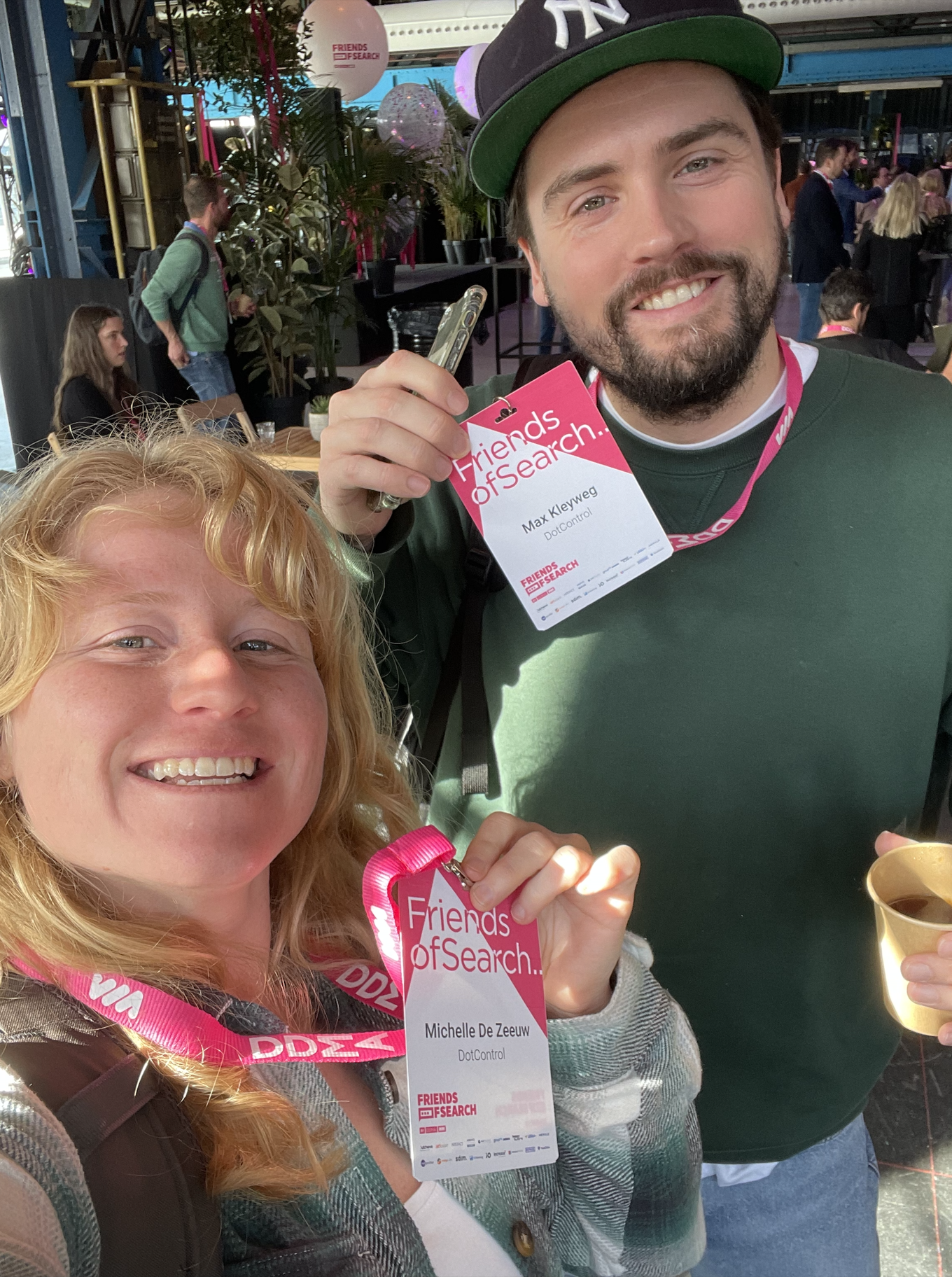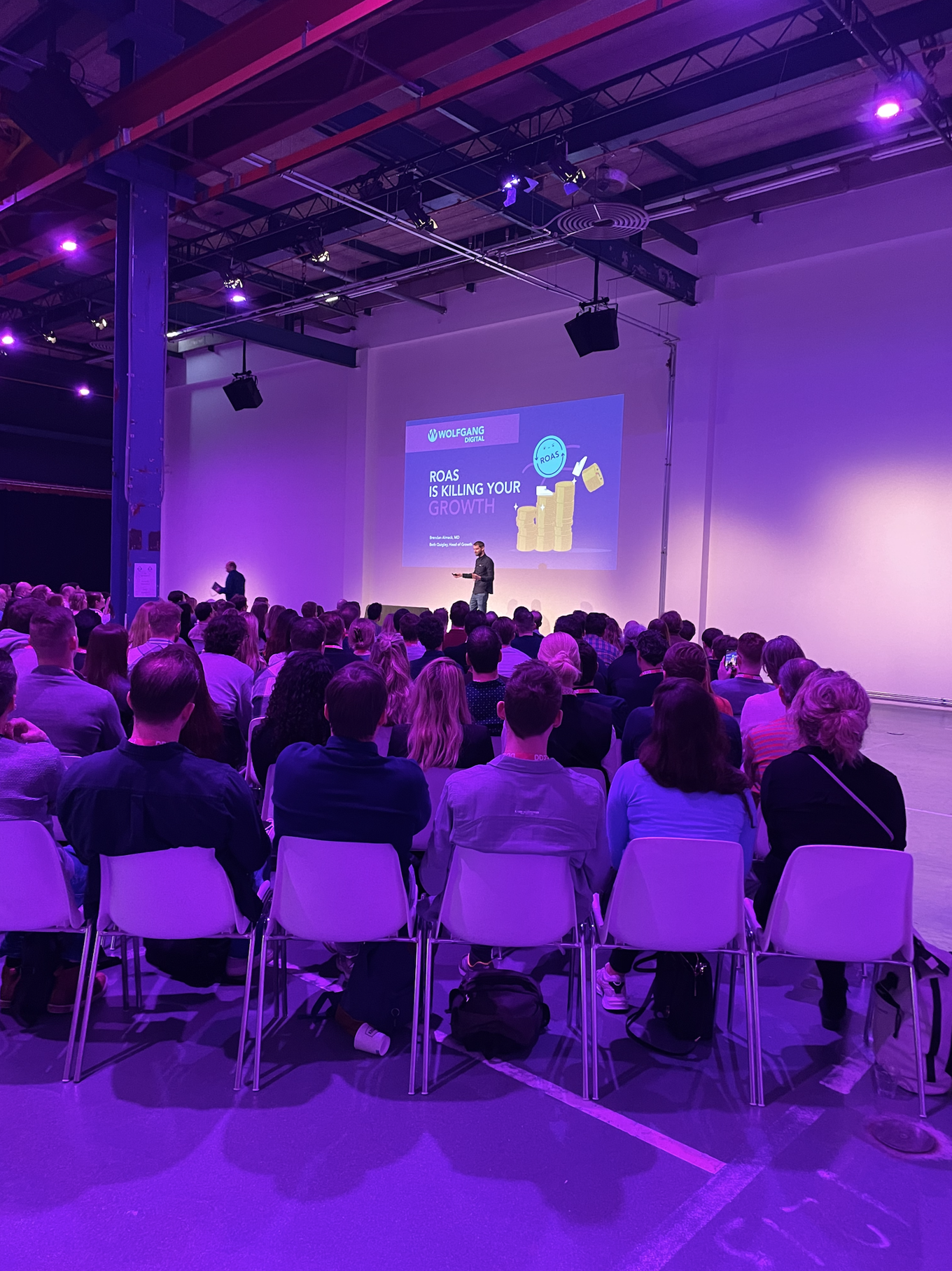Before we get into everything SEA & SEO. What became evident is that overall, in the marketing world we tend to naturally distrust content until it is provided with some sort of evidence. A few ways you can build this trust in your content strategy is through corroboration, demonstration and education.
Let's talk SEA
First of all, it became clear that most marketeers are focusing too much on ROAS. Brendan Almack and Beth Quigley from Wolfgang Digital explained why you should look beyond that. When it comes to optimising our advertising campaigns, we often rely on ROAS as a key performance indicator. However, solely focusing on ROAS can lead to stagnation in growth year after year.
While it's important to have a target ROAS for your campaigns, it's also essential to zoom out and look at the bigger picture. Instead of just concentrating on ROAS, other metrics should be taken into consideration such as New Customer Acquisition, Share of Search, and Business Growth to help our clients thrive.
By fixating only on ROAS, you may miss out on opportunities to expand reach and achieve long-term business objectives. Therefore, you should strive to strike a balance between achieving our target ROAS and looking at broader performance indicators.
Instead of just targeting ROAS, adopting a more holistic approach to campaign optimization can help drive year-on-year growth.
AI & SEA
Another rising topic concerning SEA nowadays is: Will chatbots replace human expertise in SEA? There is growing concern that human expertise may no longer be needed. However, Silicon Valley entrepreneur Fred Vallaeys, reassures us that humans still play a crucial role in SEA and that chatbots cannot replace them entirely.
During one of the talks, Vallaeys shared some useful tips on how to use AI to enhance SEA performance while still leveraging human expertise. A few examples:
- Use ChatGPT as text generator and to tell a story. It can be a great tool for writing ad texts.
- Clear prompts are essential to get the most out of a chatbot like ChatGPT. But don’t be overly detailed, that will work against you.
- You can use chatGPT to score your search terms by relevance.
- Use ChatGPT to get insights on your audience and the topic of your landing pages if you are unsure what to say and who to target.


SEO Insights
SEO continues to be a vastly changing area. Let’s dive into some key takeaways from the event focusing on SEO:
Internal links are hugely underrated
Their general role is to point to a page determining its importance within the platform. Now balance here is key. We all know the huge footers. Saying everything is important makes nothing important. Therefore, it’s advised to break down pages in templates, build logical relationships between them and secure this via dedicated link blocks for scalability.
Keep your content aligned
We were once more reminded of the intent lifecycles of keywords and that they can vary across different “query families”. Learning to keep your content aligned with the users’ intent all the time.
AI was a much-discussed topic during this edition of FoS. And although most speakers agreed that AI will not entirely replace search – some even referred to it as industrial grade bullshit generators – it will for sure change and enhance the way people search. Also, for SEO’ers AI tools can create a lot of efficiencies, but we must not misuse them. Why? Well, it can completely backfire with Google’s helpful content update. Since august 2022 its intention is to elevate content that is made by humans and devalue content written for SEO purposes. This unhelpful classifier flags SEO spam, grey area in the middle of content that is not entirely helpful. So what does unhelpful content look like? It could be one of the following:
- Sites pretend to be experts in too many topics
- Information is generic without unique or expert insights
- Information lacks detail or specificity
- Content velocity and topic selection seems to reflect SEO first approach
- Overwhelming ads and affiliate links
AI & SEO
First of all, the use of AI in generating helpful content CAN be okay if:
- It is original & high-quality
- It demonstrates E-E-A-T
- It satisfies the helpful content system
- It doesn’t propagate misinformation
- It isn’t created for the primary purpose of manipulating search results
When using AI keep the following important caveats in mind: disclose author names, disclose use of AI and never list AI as the author. AI is not only going to make our lives easier, but it will also for sure make finding competitive advantage more difficult. We need new ways to compete in a sea of sameness we risk drowning in.
What trends will dominate 10 years from now?
Talking about the SEO trends of the last years Friends of Search event, such as AI, machine learning algorithms and changing SERP features, also made us talk about what search will look like in 2033.
If you let us take a guess, we believe some of the following is most likely to happen:
- Machine learning and AI will become black box systems
- SERP features will become powered by AI and Knowledge graph.
- Conversational search instead of questions will become a thing
- Predictive search: your device will give you an answer before you even ask
- Headless websites: no front-end just data for search engines.